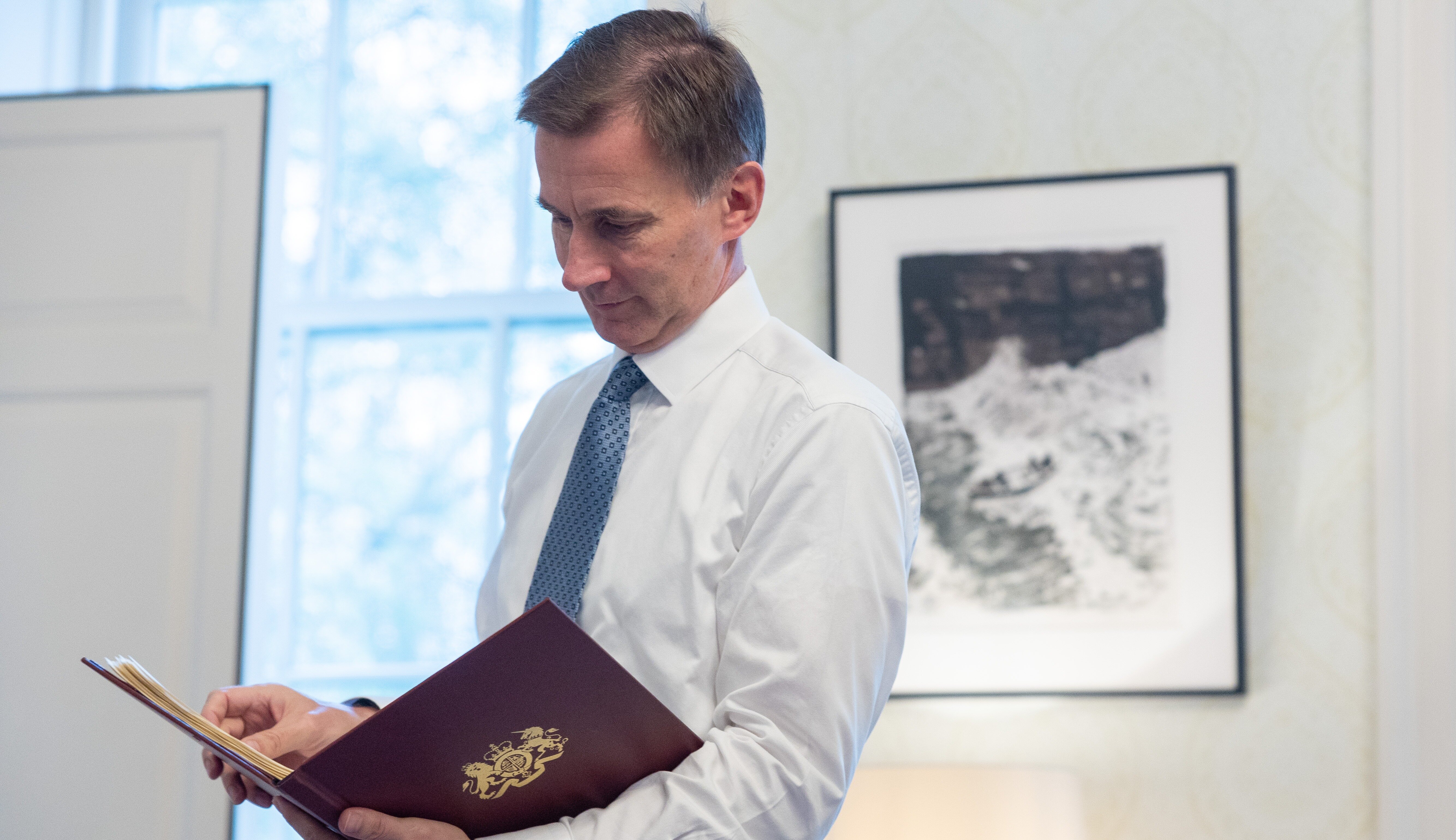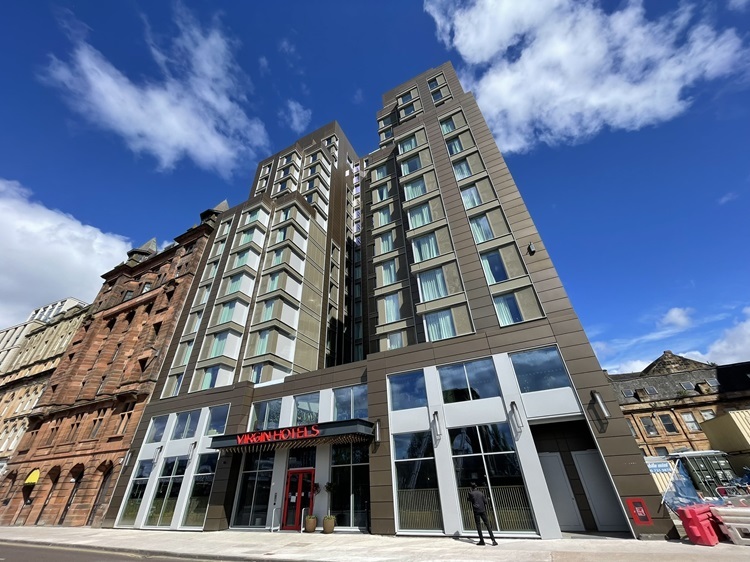Operators will be 'left facing collapse' after chancellor fails to deliver hospitality support
Hospitality operators have accused the chancellor of failing to do "anything of any consequence" for independent businesses in today’s Autumn Statement with fears many be left "facing collapse".
The key announcement from chancellor Jeremy Hunt for hospitality related to business rates. The government will proceed with the revaluation of business properties from April 2023 and will "soften the blow" with a nearly £14b tax cut over the next five years. Hunt said nearly two-thirds of properties "will not pay a penny more" next year and "thousands of pubs, restaurants and small high street shops" will benefit.
A new government-funded transitional relief scheme will also be introduced, as called for by business trade bodies, which Hunt said will benefit around 700,000 businesses.
There will be no changes to the energy relief package announced under Liz Truss and it was confirmed that support for households will be extended for a further year.
Crucially for many businesses, despite lobbying, the chancellor confirmed that the current VAT threshold will be retained until March 2026.
Responding to the chancellor’s statement, which had opened with him confirming the UK was in recession with inflation set to hit 9.1% this year, Dan Brod, co-owner of the Beckford Group, said: “Every good hospitality operator knows that we are in a perfect storm. Our costs are dramatically rising right across the board: food, drink, wages, ‘beyond a joke’ utilities and landlords are trying to hike rents. But our prices cannot go up accordingly because our guests are also being squeezed. We all know that our biggest competition is not each other, but people staying at home instead.
“The government know it simply doesn’t add up, and this statement has not done anything of any consequence for independent, smaller operators that make up most of our industry and we all ought to be extremely frustrated. Country pubs in particular are often some of the biggest local employers, particularly of younger people. My message to government and our communities would be this, ‘pubs are the very fabric of British society (that Jeremy Hunt referred to so fondly in his speech) and this needs to be valued differently if you want this social benefit, and our economic benefit, to continue’.
“Our pubs will do everything they can, we will soldier on, looking after all our guests and our staff, as we always have done - but, make no mistake, this industry is now in crisis, and this has, bizarrely, not been recognised in any way in the Autumn Statement.”
Martin Williams, CEO of Rare Restaurants which trades as Gaucho and M Restaurants, commented: “Whilst the restaurant sector will welcome the confirmation that the April 2023 business rates revaluation will go ahead and potentially become more equitable for hospitality venues, there was nothing in this budget to address the continuous unfair burden of a 20% VAT rate in restaurants and bars in comparison to a 10% rate on the same products when sold as retail.
“In the backdrop of hyper-inflation and an energy crisis, this lack of support, fairness, nor equity will leave many SME’s and entrepreneurs facing collapse in January, unable to pay suppliers, wages, VAT, rent and rates due to working capital shortfalls. This situation was wholly avoidable and could have been addressed by the VAT reduction which our sector lobbied for. This frustration is compounded by the news of a VAT freeze until 2026.
“Furthermore this budget has failed to recognise the chronic staff shortage in hospitality, which could be easily remedied by a relaxation of immigration rules which currently restrict employment and stifle growth."
> For a full breakdown of the Autumn Statement click here
Natalie Isaac, co-founder of the Bar44 group of tapas restaurants, bars and a hotel, said: "The government support in the statement today is nowhere near enough to safeguard hospitality businesses and the future looks bleak for many, particularly for the early part of 2023.
"As always the devil will be in the detail with the transitional business rate relief scheme and we will have to see what the parameters are and whether they help us directly.
"No reduction in the rate of VAT is hugely disappointing after the sector has campaigned for this. Energy support will be crucial for the sector beyond the first six months as many businesses have been forced into signing one year plus contracts at an over 300% increase in KWH just to get electricity supplied to their property in order for them to continue trading.
"The next few months are going to critical for many SMEs in particular, jobs are most certainly at risk as it would seem inevitable that sales will start to fall with the cost of living crisis hitting everyone's pocket, particularly post Christmas."
Stosie Madi, chef-patron of Parkers Arms in Newton-in-Bowland, Lancashire, said: "Higher mortgages, rates and more expensive food and fuel bills will mean failed businesses and rising unemployment.
"This is disastrous for hospitality because every household will be hit. Eating out will become a luxury, which is a terrifying prospect. Worrying times."
Danny Pecorelli, managing director of the Exclusive Collection, told The Caterer there were four things the industry needed: a reduction in VAT, the structural reform of business rates, the opening of the labour market and support in relation to energy and inflation.
He added: “An increase in the living wage is good for everyone, but I get a sense they haven’t tackled the core issues and what the industry needs is confidence, and I don’t get a sense this budget has delivered confidence.”
John Nugent, chief executive of contract caterer Green & Fortune, said: "It’s a ‘steady the ship’ type of budget. Uninspiring for the broad hospitality sector.
"Still the same challenges ahead with consumer and business confidence firmly in the balance. Inflationary pressures are still ahead with rising costs a constant. Assistance with business rates is helpful but long term reform is needed. We are in precarious times."
Sacha Lord, the night time economy adviser for Greater Manchester, said: "With these announcements, we will inevitably see a notable downturn in consumer spending over the coming weeks and months, at a time when operators need the most support as they recover from the hangover of pandemic-related debt.
"Disposable income underpins our UK economy and I’m hugely concerned that the policies outlined today will create a severe contraction in the sector. Spending on luxuries such as dining out is naturally the first to go in times of cutbacks and the hospitality sector is wide open to be the first to suffer.
"Operators are being squeezed beyond their ability, and I fear we will now see huge cuts in staffing, reductions in opening hours and venues closing at a faster rate faster than seen during the pandemic.
"It is a very sad state of affairs and there will be many extremely worried business owners in the UK tonight.”
UKHospitality chief executive Kate Nicholls, said: “The chancellor painted a grim picture of what we’re facing as a nation and Britain’s hospitality businesses are already in the midst of severe economic turmoil.
“Survival this winter is the priority for venues across the country and there is the very real possibility that a significant proportion of our sector will not survive the winter. It was crucial that the government addressed this today.
“I’m pleased that the chancellor has listened to the vast majority of UKHospitality’s proposals on business rates, covering a freeze in the multiplier, extended reliefs and no downward transition. This means those seeing their valuations decrease will see the benefit in their bills immediately, at the same time as increases are capped.
“However, it remains the case that the current system is outdated and not fit-for-purpose. The government made a manifesto commitment of root and branch review and it’s essential that this delivered as soon as possible.
“It was also encouraging that the chancellor confirmed that energy support will continue post-April for the most vulnerable sectors, of which hospitality has already been recognised.
“What we failed to hear today from the chancellor was any plan for economic growth, despite him recognising its importance. Businesses create jobs, deliver higher wages and contribute millions in tax revenues but without a serious plan from the government, margins continue to be squeezed without a path forward to growth.”




















